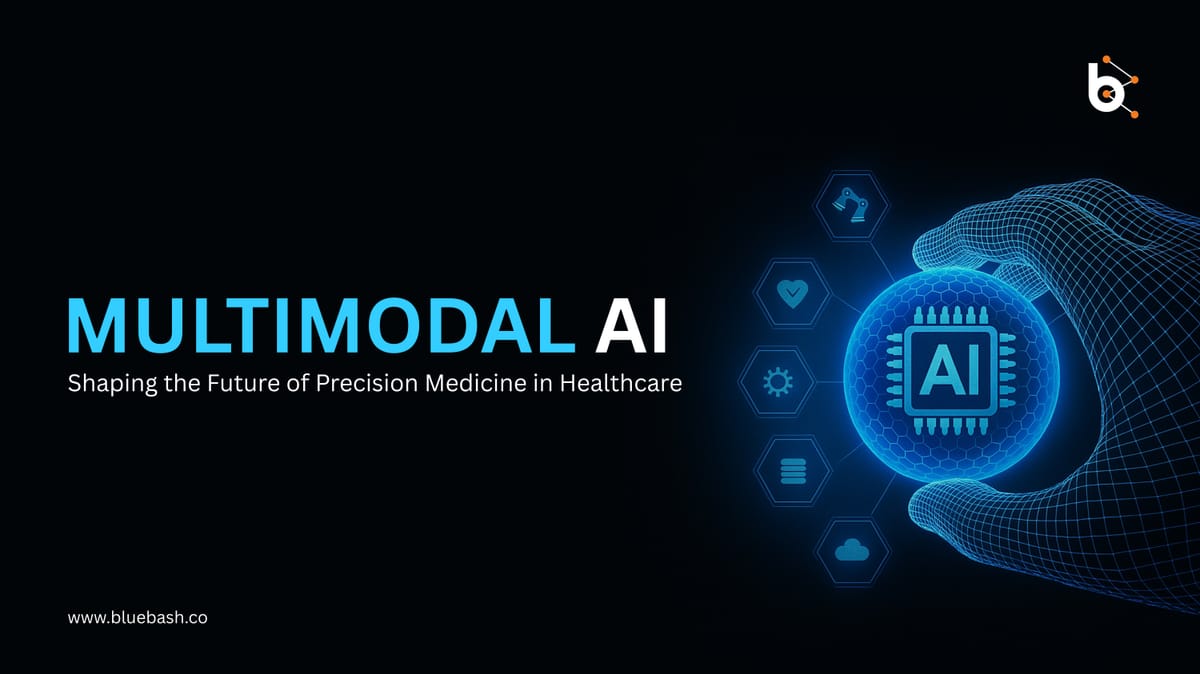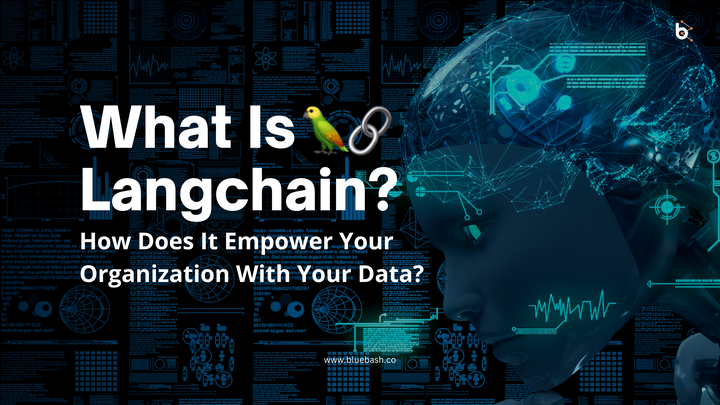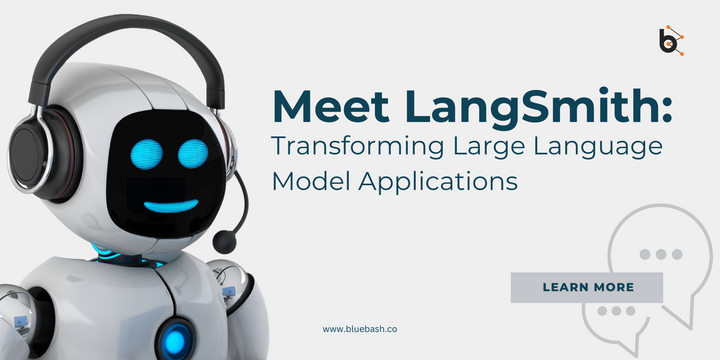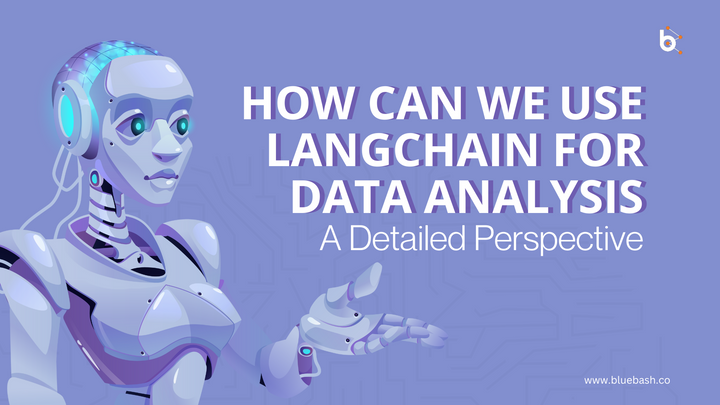How Multimodal AI Is Shaping the Future of Precision Medicine in Healthcare?

The future of healthcare is not just digital—it’s intelligent, adaptive, and deeply personalized. At the forefront of this transformation lies multimodal AI, a powerful advancement that is revolutionizing how we understand and treat individual patients. By seamlessly integrating diverse data sources—imaging, genomic sequences, EHRs, patient history, and real-time vitals—multimodal AI in healthcare is enabling a new era of precision medicine with AI.
This blog explores how multimodal artificial intelligence in medicine is not only enhancing diagnostics and treatment, but also improving outcomes and personalizing care like never before. If you're wondering how this paradigm shift is reshaping modern medicine, you're in the right place.
What Is Multimodal AI in Healthcare?
Multimodal AI refers to artificial intelligence systems that process and synthesize information from multiple data types or “modalities.” In healthcare, these modalities can include:
- Medical images (CT, MRI, X-rays)
- Genomic and proteomic data
- Electronic health records (EHRs)
- Wearable device data
- Natural language (clinical notes, pathology reports)
- Lab results and more
Multimodal AI in healthcare combines different types of data, allowing drawing additional conclusions, providing predictions about a patient in context, and designing specific interventions that are based on the individual biological and clinical profile.
That is the basis of AI in precision healthcare the use of intelligently trained algorithms to not only help identify the disease but determine how it will progress, what the molecular causes are, and which ways to help are the most effective and are suitable to an individual.
The Role of Multimodal AI in Advancing Precision Medicine
Precision medicine through AI aims at abandoning the all-one-fits-all concept of healthcare. It focuses on personal differences in genes, environment and lifestyle in the development of treatment and prevention plans. Multimodal AI will quicken down this vision, as sophisticated, individualized analysis is not only feasible, but also scalable.
- Enhanced Diagnostic Accuracy
The integration of radiology images with EHRs and lab values can assist AI models in identifying the patterns that would remain unknown otherwise. In this regard, a multimodal AI, which combines the analysis of lung CT scans, the smoking history and genetic markers of the patient and the previous history of respiratory incidents, can be used to detect the early signs of lung cancer more reliably than analysing the images alone. - Personalized Treatment Planning
Multimodal AI models ensure the combination of information related to clinical trials, records of responsiveness, and molecular markers to propose treatment methods depending on the biological and behavioral characteristics of a specific patient. This has been very promising in oncology, where oncologists are matching therapy to tumor genomics to maximize efficacy and minimize adverse effects. - Predictive Risk Modeling
Multimodal AI aids in proactive care as it will be able to predict who is at-risk even before symptoms present themselves. An example is the combination of the wearable lifestyle data with genomic predisposition and family history that allows early intervention of chronic diseases such as diabetes, cardiovascular, and neurological diseases.
This is a prime example of AI for personalized healthcare—intervening before disease strikes.
Real-World Applications: Multimodal AI Transforming Healthcare
Let’s look at some of the most impactful ways multimodal artificial intelligence in medicine is being used:
- Cancer Diagnostics and Therapy Optimization
With the introduction of AI tools, pathology slides, gene expression data, and patient demographics are now combined together to provide real-time suggestions of diagnosis and a treatment pathway. An example is breast cancer where the use of mammogram taken together with hormonal receptor status and genomic signatures enables the oncologist to customize treatment of each patient to a maximum. - Neurodegenerative Disease Monitoring
In such cases as Parkinson's or Alzheimer the disease develops slowly and multimodal AI would monitor minute variations in motor behavior, speech, cognitive ability, and brain scan over time. This constant observation does not only assist in identifying the disease in its early stages but can be used in narrowing down on treatment as it progresses. - Cardiology and Stroke Prevention
AI systems can achieve quite a high level of accuracy of identifying arrhythmias or predicting the risk of stroke by combining ECG, blood pressure, lifestyle indicators, and clinical history. This system is revolutionising emergency medicine, such that precision intervention actually takes place prior to catastrophic events bearing fruit.
AI-Driven Clinical Decision Support Systems (CDSS)
Multimodal AI is the powerhouse behind next-generation AI-driven clinical decision support systems. These platforms assist physicians by:
- Prioritizing diagnoses based on multimodal data analysis
- Highlighting anomalies in medical records
- Suggesting treatment options backed by evidence and tailored to the patient’s profile
- Automating documentation and administrative tasks to reduce cognitive burden on clinicians
In essence, these tools act as intelligent co-pilots, allowing healthcare providers to make faster, more confident, and more personalized decisions.
How Multimodal AI Improves Precision Medicine Outcomes
The ultimate promise of multimodal AI in healthcare is its potential to improve outcomes—not just in terms of survival rates, but in patient quality of life, cost-efficiency, and equity of care.
- Reducing Diagnostic Errors
Cross-validated evidences brought out by multimodal systems significantly diminish the occurrence of false positives and false negatives. It is vital in high risk fields such as oncology and cardiology where inaccuracy in diagnosis may result into further delivery of treatment or non-intervention. - Accelerating Time to Treatment
Multimodal AI reduces the time that takes patient data to diagnose a patient and take action by automating the creation of large quantities of patient data and providing suggestions in the moment. This efficiency is what is needed between reversal and advancing of diseases. - Enabling Continuous Learning
Machine learning AI systems have the ability to learn over time by analysing additional data-sets on patients- learning more and more. It implies that precision medicine is more accurate as time passes, and it is powered by real-world evidence and insights at population level. - Empowering Patients
With AI tools gaining popularity on the patient-facing platform (e.g. wearables and health apps), people receive detailed information about their health progress, adherence to treatment and lifestyle suggestions and all of this is backed by insightful information generated through personalized AI-powered platform.
Challenges and Ethical Considerations
While the promise is enormous, AI solutions for healthcare must overcome several challenges to be adopted widely and ethically:
- Data Interoperability: It is one of the significant technical challenges to make the various formats of data of different systems of the hospital agree.
- Bias and Fairness: AI machines cannot give equal care when they are trained on biased data. In their duty to their consumers, developers need to make sure that their algorithms are not peddling demographic discrimination with the code they write.
- Privacy and Consent: There is a burning issue on who owns genetic data and whether patients consent to the free usage of their genomes and their combination with the lifestyle data integrated.
- Clinical Validation:No AI system is an exception as all of them require clinical validation prior to their deployment.
It is through such concerns that we are made to realize that AI in precision healthcare should not only serve those that can afford it- but that it becomes a universal means by which people can access care.
Why Choose Bluebash for Multimodal AI in Healthcare?
At Bluebash, we don’t just build AI solutions—we co-innovate with healthcare leaders to shape the future of medicine. Our deep domain expertise, agile development approach, and commitment to ethical AI make us the trusted partner for organizations looking to implement multimodal artificial intelligence in medicine and drive transformative results.
Here’s why leading healthcare innovators choose Bluebash:
- Domain-Focused Expertise in Healthcare AI
We are familiar with the twists and turns of clinical settings, the electronic health records (EHRs), regulatory issues (such as HIPAA), and patient privacy. The group that we have is grounded in the application of AI in the medical field and is customized in accordance to the practice of medical workflow. - Custom Multimodal AI Architectures
Our focus is on developing bespoke multimodal AI pipelines, which fit your data topography and precision medicine objectives, whether it is in the analysis of medical images, genomic data and interpretation, or in using NLP to interpret clinical notes. - End-to-End AI Consulting & Development
Throughout the end-to-end AI lifecycle - starting with ideation and use-case exploration through model development, deployment, and lifecycle monitoring, Bluebash makes it easy to deliver value. Our climate-friendly AI-modeling software covers everything you may need, from a proof of concept to a production-ready AI-platform. - Human-Centered Design
Our AI tools are user-friendly and developers also think about those doctors best served by our tools. We do not only concentrate on performance but on usability and adoption as well, so that your providers and patients benefit indeed. - Proven Track Record & Scalability
We have provided scalable, regulatory-conforming and powerful solutions to both startups and large enterprises. Our transparent, quick approach enables us to do things quicker and be flexible to your changing needs. - Commitment to Ethical and Fair AI
We adhere to the highest standards in responsible AI development, ensuring that your AI-driven clinical decision support systems are accurate, explainable, and free from bias.

What the Future Holds: A Glimpse Ahead
Looking forward, multimodal AI in healthcare will evolve along several exciting lines:
- Digital Twins: Making virtual replicas in real-time of the individual patient to simulate disease progression and the response to treatment.
- Federated Learning Models:Preventing the privacy invasion of decentralized, patient-privacy-protecting learning with AI.
- Multilingual NLP in Medicine: Increasing AI usability by helping it to work with non-English medical records.
- AI-Clinician Collaboration Models: A utility that should support the physician rather than substitute him- supplementing the human decision-making capabilities with those of an algorithm.
As these innovations mature, precision medicine with AI will shift from being a frontier technology to a mainstream standard of care.
Conclusion: The Human Impact of Multimodal AI
Multimodal artificial intelligence in healthcare is a change of central importance that leads to more intelligent, empathetic, and accurate health care. The combination of knowledge of the imaging, genomics, clinical records, or real-time patient data is enabling AI in precision healthcare a chance to assist clinicians in deciding much more correctly and quicker and in a much more personalized way and eventually enhance the results and save lives. It is not the matter of technology, but it is the matter of how to change the care experience of each person to make it really personalized and actually proactive.
As this AI-driven transformation accelerates, choosing the right development partner is crucial. At Bluebash, we specialize in delivering secure, scalable, and ethically designed AI solutions for healthcare that bring your vision of precision medicine with AI to life. Whether you're a healthtech startup or a healthcare institution, we help you harness the power of multimodal AI to innovate with confidence and deliver measurable patient impact. Let’s build the future of personalized care—together.
FAQ's
- What is multimodal AI in healthcare and how does it work?
Multimodal AI in healthcare integrates diverse data like medical images, genomics, EHRs, and wearable data to generate deeper, context-aware clinical insights—enhancing diagnostics and enabling truly personalized treatment decisions. - How does multimodal AI improve precision medicine outcomes?
It boosts diagnostic accuracy, enables tailored treatments, reduces time to intervention, and supports continuous learning from real-world patient data—ultimately improving outcomes and care efficiency. - What are the top benefits of using multimodal AI in precision healthcare?
- Reduced diagnostic errors
- Faster and more accurate treatment planning
- Proactive risk prediction and intervention
- Personalized patient engagement through smart tools
- Is multimodal AI used in real-world clinical settings today?
Yes, it’s already applied in cancer diagnostics, stroke risk prediction, Alzheimer’s monitoring, and AI-driven clinical decision support systems across hospitals and research institutions worldwide. - Why should I choose Bluebash for healthcare AI solutions?
Bluebash specializes in ethical, scalable multimodal AI for healthcare—offering deep clinical domain expertise, custom AI pipelines, and end-to-end development for precision medicine transformation.



